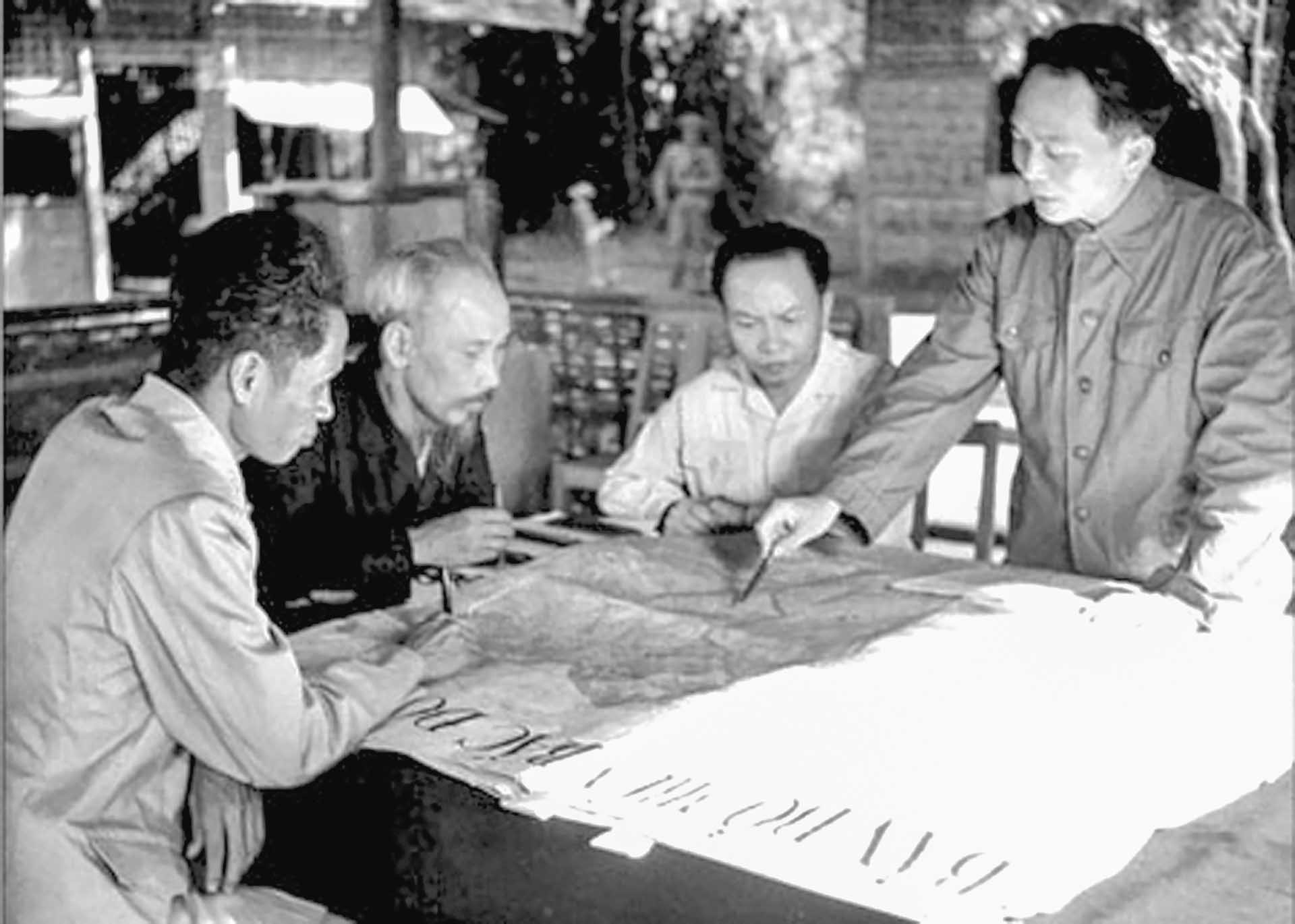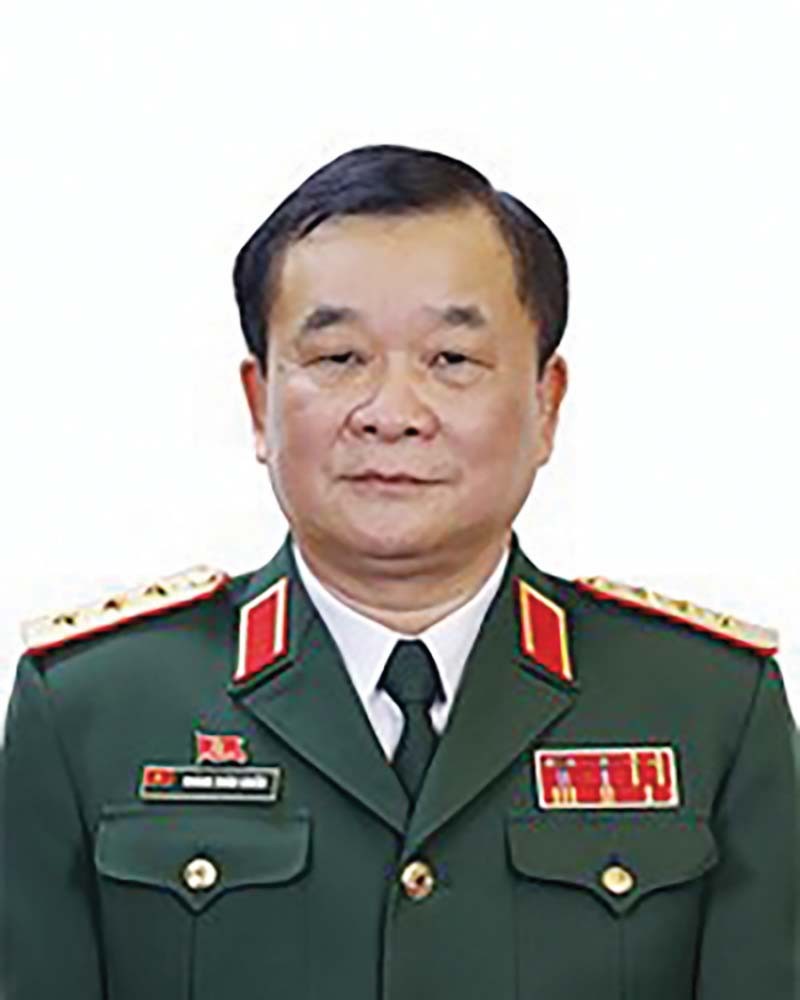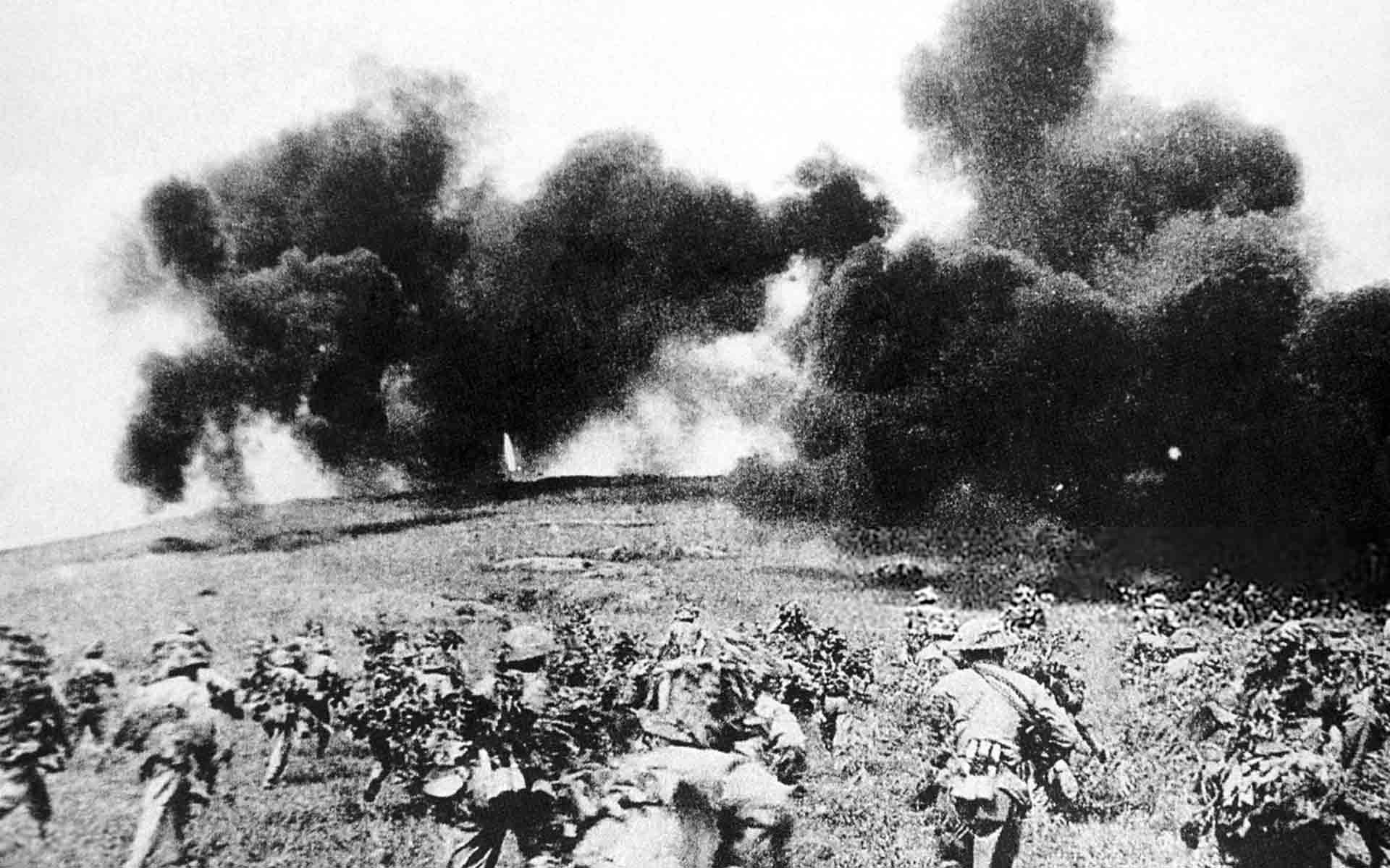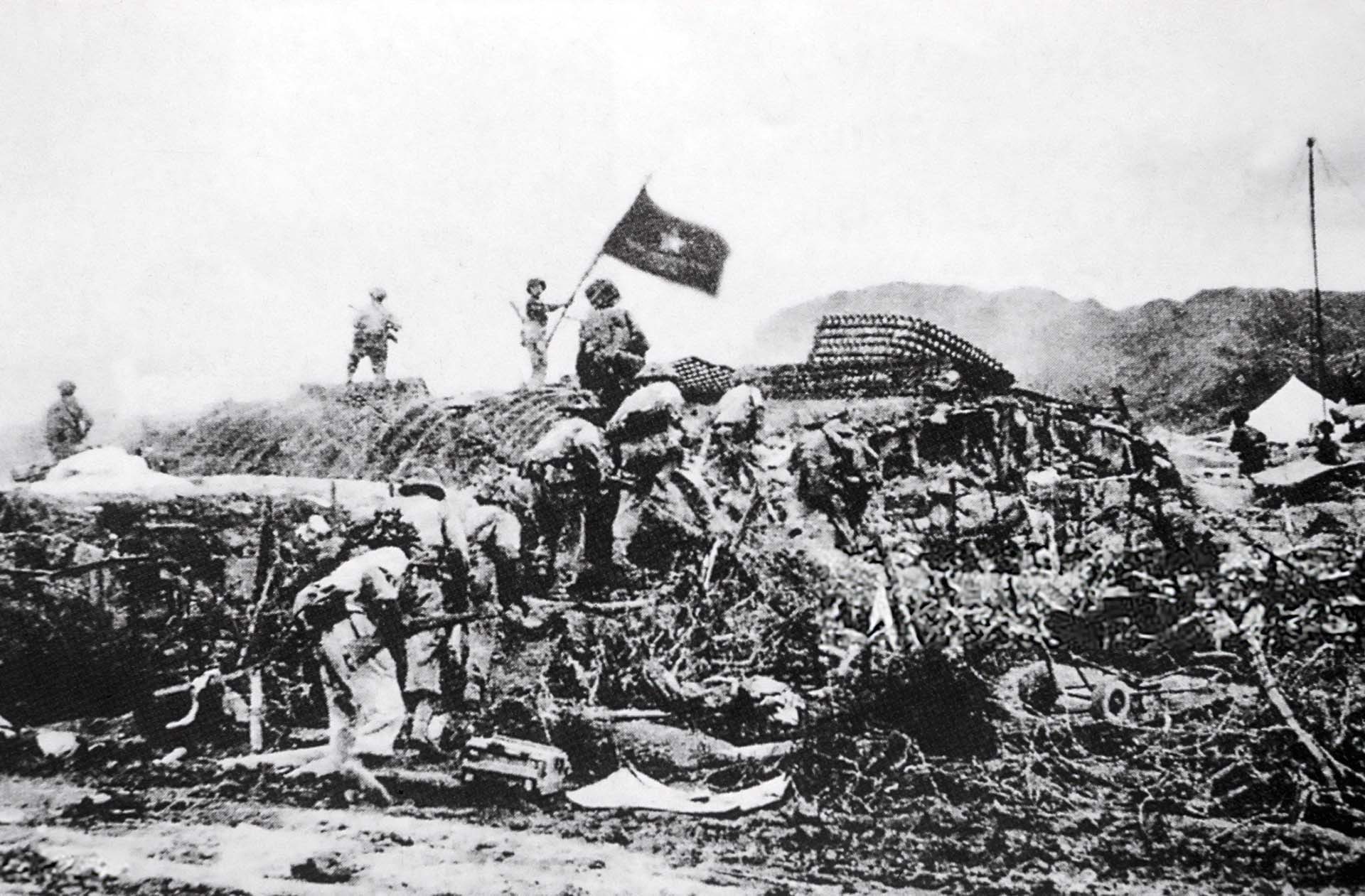
Role of Armed Forces in the success of the Geneva Agreements
Latest
 |
| General Vo Nguyen Giap presented to President Ho Chi Minh and other Party and State leaders the plan to open the Dien Bien Phu campaign in 1954. (Source: VNA) |
Direct impacts on early days of the Geneva Conference
Since the Armistice agreement on the Korean Peninsula was signed in mid-1953, the trend of détente had attained momentum globally, with major powers seeking to resolve conflicts through negotiations. On February 18, 1954, during the foreign ministerial conference held in Berlin, the Soviet Union, United States, United Kingdom, and France agreed to convene an international conference in Geneva, Switzerland, to address the Korean issue and restore peace in Indochina.
On April 26, 1954, the Geneva Conference commenced. At the same time, in the cauldron of Dien Bien Phu, the French Far East Expeditionary Corps was in a desperate situation caused by the strong offensive of the Vietnamese People’s Army units. After the Him Lam and Doc Lap strongholds were annihilated, the French Far East Expeditionary Corps at Ban Keo had to surrender. Simultaneously, a series of strongholds in the eastern part of Muong Thanh were destroyed, putting the French
 |
| Senior Lieutenant General, Assoc. Prof. Dr. Hoang Xuan Chien Member of the Party Central Committee, Member of the Central Military Commission, Deputy Minister of National Defense |
Far East Expeditionary Corps in a passive and confused position. However, since the Dien Bien Phu battle had not been settled yet, the French colonialists still harbored their hopes of achieving a military victory, gaining advantage in negotiations to end the war in Vietnam with honor. It wasn’t until early May 1954, that the French Far East Expeditionary Corps at the Dien Bien Phu stronghold was completely surrounded and squeezed by the Vietnamese People’s Army. It was impossible to salvage the situation, then the French colonialists and its allied were forced to sit down at the negotiating table with the Democratic Republic of Vietnam. On the afternoon of May 7, 1954, the French Far East Expeditionary Corps Command at the Dien Bien Phu stronghold surrendered. The Dien Bien Phu campaign of the Vietnamese army and people came to a complete victory. The nine-year arduous resistance war under the leadership of the Party Central Committee, led by President Ho Chi Minh, eventually triumphed.
On May 8, 1954, a day after the Dien Bien Phu victory, the Geneva Conference was convened to discuss termination of war and restoration of peace in Indochina. The conference was attended by delegations from nine parties: Soviet Union, China, United States, United Kingdom, France, the Democratic Republic of Vietnam, the State of Vietnam, the Kingdom of Laos, and the Kingdom of Cambodia. The delegation of the Democratic Republic of Vietnam, headed by Deputy Prime Minister Pham Van Dong, attended the conference in the position of a victorious nation. From the very first session, the delegation of the Democratic Republic of Vietnam presented an eight-point stance for a comprehensive solution both militarily and politically for the Indochinese Peninsula. On the military front, the Democratic Republic of Vietnam proposed a ceasefire, withdrawal of foreign troops, and restoration of peace in Indochina. Politically, the Democratic Republic of Vietnam called for ensuring peace, independence, unity, and territorial integrity of Vietnam, Laos, and Cambodia, and ending the colonial regime of France in Indochina. The French delegation, led by Foreign Minister Bidault, announced the defeat of French troops at Dien Bien Phu and proposed in principle a ceasefire throughout Indochina to ensure the safety of French expeditionary forces.
It can be affirmed that the victory of the strategic Winter-Spring 1953-1954 offensive, culminating in the Dien Bien Phu victory with the core force being the Vietnamese People’s Army, was the decisive factor that brought the delegation of the Government of the Democratic Republic of Vietnam to the conference table, forcing France to negotiate directly with the legitimate representatives of the Vietnamese people, disrupting the legitimization of the puppet government of Bao Dai established by France, and creating an advantage for our delegation in negotiations. As President Ho Chi Minh asserted: “Real strength is the gong, and diplomacy is its sound. The bigger the gong, the louder the sound.” The resounding victory at Dien Bien Phu was the giant gong that echoed globally, heavily impacting the Geneva Conference, completely shattering the ambitions of French colonialists and the aggressive intervention of the American imperialism, forcing them to sit down for negotiations with the Government of the Democratic Republic of Vietnam. In other words, the historic victory of Dien Bien Phu altered the course of the war, being the decisive factor for the success of the Geneva Conference, and laying the foundation for us to strive for a comprehensive political and military solution to the Vietnam issue at the negotiation table.
Shaping the discourse and eventual outcomes of the Conference
Following four plenary sessions and eight meetings at the head of delegation level, the Geneva Conference, on May 29, 1954, reached a resolution to enact a comprehensive ceasefire. Accordingly, representatives from the General Command of the People’s Army of Vietnam and the High Command of French Far East Expeditionary Corps in Indochina would meet, both on-site in Vietnam and in Geneva, to deliberate on the organization of military forces in accordance with the ceasefire agreement, with primary attention directed toward delineating troop concentrations in Vietnam.
In parallel with diplomatic initiatives at the Geneva Conference, in June 1954, the General Command issued directives outlining military operations for the armed forces stationed in the Red River Delta region throughout the summer. The overarching objective was to sustain and strengthen military activities by coordinating regular forces with local military units and guerrilla militias. This effort aimed to neutralize enemy forces, degrade their capabilities, defend against advances, thwart incursions, resist conscription and simultaneously reinforce and expand guerrilla bases and zones to disrupt the enemy’s efforts to consolidate and concentrate forces in the plains. Following directives from the General Command, the armed forces intensified their offensive against the enemy to complement diplomatic efforts at the negotiating table. From early June and particularly the end of June until early July 1954, enemy forces commenced withdrawals from numerous positions in the midlands and southern Red River Delta. The victories achieved by our forces on the battlefield continued to wield significant influence and actively supported the proceedings of the Geneva Conference.
 |
| Vietnamese soldiers attacked a French stronghold in the battle of Dien Bien Phu in 1954. (Source: Gettyimages) |
In accordance with the agreement between the Democratic Republic of Vietnam and France, a military conference was convened on-site in Trung Gia (over 30 km south of Thai Nguyen, now is a part of Soc Son district, Hanoi) from July 4, 1954, to July 27, 1954. The conference brought together delegates from the General Command of the People’s Army of Vietnam, led by Major General Van Tien Dung, and delegates from the High Command of the French Far East Expeditionary Corps in Indochina, led by Colonel Lennuyeux. While the Geneva Conference focused on fundamental principles to end the war, the Trung Gia Conference witnessed intense negotiations between the People’s Army of Vietnam and the French Far East Expeditionary Corps on specific military issues. Discussions encompassed matters raised at the Geneva Conference, including prisoners of war, realization of ceasefire, adjustment of troop concentration zones, and the Military Liaison Commission. Notably, both sides emphasized the importance of ensuring conditions for scheduled ceasefire as stipulated in the Geneva Agreement. The Trung Gia Military Conference marked the first formal negotiation between the General Command of the People’s Army of Vietnam and the High Command of the French Far East Expeditionary Corps in Indochina during the preparatory phase for ending the people›s resistance against French colonialism. Lasting for 23 days, the conference held a significant historical meaning. The delegation from the General Command of the People’s Army of Vietnam, guided by the Central Military Commission and the General Command, effectively fulfilled their mission entrusted by President Ho Chi Minh, actively contributing to the success of the Geneva Conference and creating a distinct mark of military diplomacy in Vietnam’s foreign affairs.
After enduring 75 days and nights, 31 sessions, alongside numerous bilateral and multilateral meetings on the sidelines of the conference, the Geneva Agreement on the cessation of hostilities in Indochina was signed on July 21, 1954. Concurrently, the Geneva Conference was concluded and endorsed a Joint Declaration. On behalf of the General Command of the People’s Army of Vietnam, Major General Ta Quang Buu, Deputy Minister of National Defense, and Major General Denteil, representing the High Command of the French Far East Expeditionary Corps in Indochina, signed the Agreement on the cessation of hostilities in Vietnam on July 21, 1954.
 |
| Vietnamese soldiers raised the flag on the roof of De Castries bunker in Dien Bien Phu, May 7, 1954. (Source: Gettyimages) |
The Geneva Agreements marked a monumental triumph for the Vietnamese people in the protracted struggle against French colonialism. For the first time, the French government and participating nations at the Conference were compelled to respect Vietnam’s national sovereignty, independence, unity, and territorial integrity, and pledged to make an absolute non-interference in Vietnam’s internal affairs, and withdraw French military forces from the region. Northern Vietnam was entirely liberated to embark on its socialist construction and provide a steadfast support from the rear for the people in the South in their ongoing quest for national liberation and reunification. This victory stemmed from the astute leadership of the Central Party and the General Military Commission, led by the esteemed President Ho Chi Minh, rooted in the patriotic tradition, unwavering determination, wisdom, and bravery demonstrated by our entire people and armed forces. Furthermore, it was a testament to Vietnam’s tradition of peace and goodwill in diplomacy, and a synergistic application of political, military, and diplomatic efforts in leveraging success in battlefields and generating strong positions at the negotiation table. The success of the Conference not only affirmed the armed forces’ pivotal role and but also their indelible mark, with the heroic People’s Army of Vietnam at its core. It was proved not only in the battlefield but also through diplomatic endeavors, from the victory of Dien Bien Phu that “resounding across the five continents and shaking the globe” to subsequent Trung Gia Conference and the Military Liaison Commission.
In today’s intricate global and regional landscapes, characterized by uncertainties and unpredictability, the task of fortifying and advancing the socialist Fatherland of Vietnam encounters multifaceted challenges. It is imperative to thoroughly study and creatively apply the invaluable lessons and experiences garnered from the Geneva Conference. These include upholding the spirit of independence, self-reliance, and unwavering defense of national interests and sovereignty, closely combining political, military, and diplomatic efforts to bolster the country’s overall strength, leveraging internal strengths and enhancing national synergy to lay the firm foundation for diplomatic activities. Such lesson remains valuable in both theory and practice. It also serves as the cornerstone for the development of the foreign policy of the Party, the State, and national defense. It also contributes significantly to the successful construction and steadfast defense of the socialist Fatherland of Vietnam in face of challenges of the new era.












